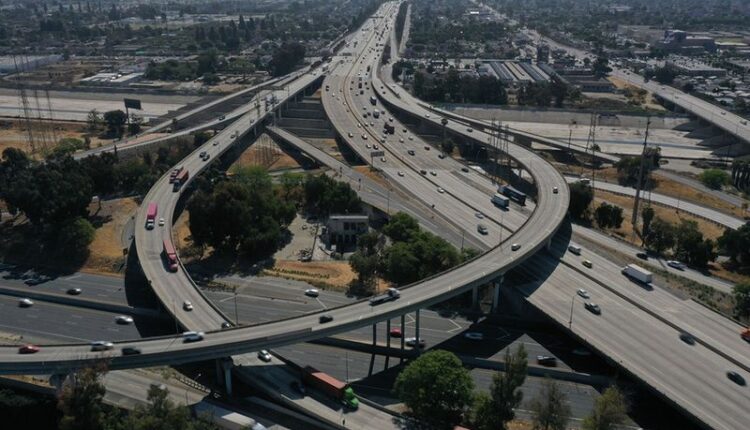Environmentalists say they are concerned the Biden administration will yield in coming days to automaker pressure and adopt modest limits on greenhouse gas emissions from cars, instead of the strict standards they say are necessary to combat climate change.
The requirements set to be proposed by the end of the month are the linchpin of the administration’s efforts to limit planet-warming pollution from the transportation sector that is now the leading U.S. source of greenhouse gases. Yet automobile companies have lobbied the Biden administration to adopt an industry-friendly approach negotiated with California that gives extra credit to electric vehicles.
Environmentalists have warned the White House not to go along.
“Our nation’s standards must be robust, have integrity and ensure strong year-over-year on-road emission reductions,” more than two dozen major environmental groups said in a letter to President Joe Biden on Thursday. “The standards must not be undermined by complex credit schemes that reward automakers for reductions on paper that aren’t matched in real world performance,” said the groups, including the Natural Resources Defense Council, League of Conservation Voters and Sierra Club.
Activists are asking Biden to mandate emissions curbs that are at least as strong as those he helped broker as vice president in 2012, when the Obama administration set a 5 percent reduction annually. However, the industry’s preferred model is a compromise California regulators negotiated with five auto companies last year that, on paper, requires them to reduce greenhouse gas emissions from their fleets by just 3.7 percent annually.
The administration’s decision is set to be an early test of the president’s commitment to using strict environmental regulations to confront climate change, even in the face of industry opposition.
Actual real-world emissions reductions under the California compromise are even lower — closer to 2.7 percent — because the deal adopted more flexibilities sought by automakers, including double counting of electric vehicle sales and extra credit for technologies that make cars more fuel efficient but don’t necessarily show up in tailpipe readings.
While the Obama administration standards developed in 2012 would eventually have accounted for emissions tied to the electricity used to charge electric vehicles, the California deal removed any requirement to acknowledge pollution from coal plants and other power sources.
The Environmental Protection Agency did not immediately comment on the matter. But White House National Climate Advisor Gina McCarthy said the government was seeking to balance many interests in the wake of the Trump administration, which relaxed standards so just 1.5 percent annual improvements were required.
“We have been working with California really closely to look at how we can make up for lost time at a pace that is reasonable but also one that’s going to allow us to be meeting some of the objectives that President Biden has put out there,” McCarthy told the Bloomberg Sustainable Business Summit earlier this week. “We are going to be looking at developing a rule that does catch up, developing a rule that goes further out, and we are going to continue to talk to the car companies.”
The Alliance for Automotive Innovation, the industry’s leading trade group, did not have an immediate comment on the green push. But alliance president John Bozzella previously has said the group’s goal is “to work collaboratively with the administration to achieve greater environmental improvements than current requirements, sooner, while providing benefits for consumers, creating opportunities for job creation and strengthening the nation’s economy.”
Model Years 2023 to 2026
The coming EPA rule is set to rewrite standards governing model years 2023 through 2026.
“We are anticipating that at least in terms of emissions reductions, they are going to fell well short of the Obama standard,” said Dave Cooke, a senior vehicles analyst with the Union of Concerned Scientists.
What’s really needed is a “long-term signal” about the administration’s commitment to more stringent emissions regulations and getting more electric vehicles on the road, he added.
In their letter Thursday, environmental groups asked Biden to set longer-term standards by the end of next year “that will ensure the U.S. can achieve 100 percent zero-emission vehicle sales by no later than 2035.”
In the near-term, they have warned against expanding extra credit for electric vehicle sales — while continuing to treat them as zero-emission cars — that could discourage automakers from moving aggressively to bolster the efficiency of the gas-powered vehicles they will sell for years to come.
“We want to see that EPA has standards that bite in the future, that actually put us on a strong EV trajectory,” Cooke said. “We want to see something that is not just platitudes about an all-electric future but that indicates a time frame, that talks about the volumes they’re looking for and talks about the work they’re doing.”
Expanding extra credit for electric vehicle sales — while continuing to treat them as zero-emission cars — could discourage automakers from moving aggressively to bolster the efficiency of the gas-powered vehicles they will sell for years to come.
“It is important to accelerate the transition to EVs and recognize that there are going to be hundreds of millions of new gas-powered vehicles made before the last internal combustion engine vehicle is sold, and those new gas-powered vehicles need to have their emissions controlled better than they are now,” said Dan Becker, director of the Safe Climate Transport Campaign for the Center for Biological Diversity.
An auto emissions program that falls short of the Obama-charted reductions is insufficient for meeting the climate challenge, said Luke Tonachel, director of the clean vehicles group at the Natural Resources Defense Council.
“Standards must result in real-world pollution reductions,” Tonachel said. “Our health and our climate can’t afford standards that are significantly weakened by extra credits that allow the industry to do less than what they can and what’s needed.”


